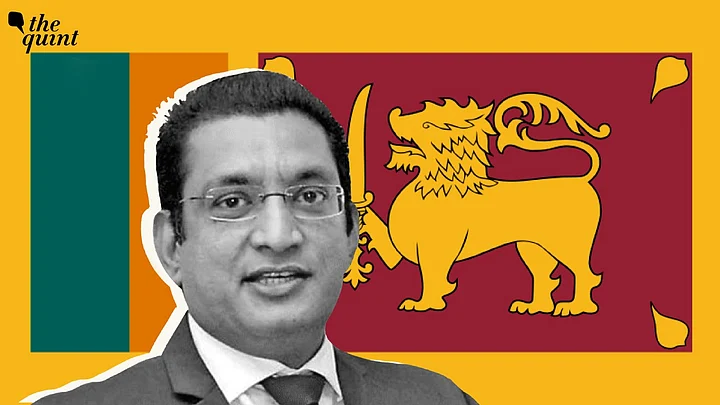As Sri Lanka stares at a long road to economic recovery, a name that is at the centre of this storm is that of its new finance minister – Ali Sabry.
In pursuit of a bailout, a four-member Sri Lankan delegation led by Sabry left for Washington DC on Monday, 18 April, for negotiations with the International Monetary Fund (IMF) and the World Bank.
Sri Lanka had declared on 12 April, that it would default on its $51 billion external debt.
While speaking to The Hindu, prior to his departure, the 51-year-old finance minister said, "We believe there is a need for a poverty alleviation programme. We definitely need a safety net for the poor. We cannot ignore the poor."
Prior to his new role, Sabry served as the minister of justice from August 2020 to April 2022. He then resigned on 3 April.
He was part of the temporary four-member Cabinet that was formed after the 26-member Cabinet (including him) resigned in the face of widespread anti-government protests in the country.
Then, within 24 hours of the temporary Cabinet's formation, Sabry offered his resignation from the finance ministry as well, something that was not accepted by President Gotabaya Rajapaksa.
He, therefore, held on to this post, and officially replaced Basil Rajapaksa as Sri Lanka's Finance Minister.
So, what else do we know about Sabry, the man helming Sri Lanka's recovery efforts?
Before Entering Politics
Sabry's alma mater consists of Kalutara Muslim Central College, Zahira College, and Sri Lanka Law College.
Having specialised in civil law, he has served as the Sri Lankan Consul General in Jeddah, Saudi Arabia, and has also represented Sri Lanka in international institutions abroad, including the United Nations Human Rights Council, according to the Colombo Times.
He has also worked at the Bar Association of Sri Lanka as its treasurer before being appointed as the President's Counsel in 2012 (for Mahinda Rajapaksa).
Sabry formally entered politics in 2020, as a member of the Sri Lanka People's Front or the Sri Lanka Podujana Peramuna (SLPP).
He did not contest the 2020 elections, but was put on the national list that made him eligible to work in Parliament, and on 12 August 2020, he was made the justice minister by President Gotabaya Rajapaksa.
Due to this, Sabry was often seen as a minister not directly chosen by the people.
'I Thought I am Not an Economist'
Sabry has downplayed his credentials, himself admitting that he is "not familiar" with economics, which is why he resigned one day after being appointed as the finance minister.
"I thought I am not an economist, I am not familiar with this area. So I thought somebody who is more suited would be ideal to do the job. That’s why I resigned. I waited three to four-five days, and in this crucial time, we appealed to anyone (to become the Finance Minister). But no one was coming forward. And then I thought at this given time, so many things are at stake, we need to protect the institutions, and we need somebody to govern. And talk to the IMF, talk to the Indian government, you need somebody to represent your country and your nation. So, with reluctance, I thought that I will take back my resignation, and do my level best," he said, during his interview with The Sunday Express.
He has maintained that with respect to Sri Lanka's economic recovery, the expectations of the government and the public need to be realistic.
"We need to protect the institutions, the central bank, banking system, its credibility, its association with payment gateways, friendly relationships with international multilateral organisations, foreign countries," Sabry added during the interview.
Sabry's Muslim Identity
The current finance minister's Muslim identity and the actions of his government have often created tensions between him, the government, and the Muslim community of Sri Lanka.
He had once resigned as justice minister after a controversial Buddhist monk, linked to an extremist group, was made the chief of a presidential task force to study a "one country, one law" proposal.
The president had refused to accept Sabry's resignation.
As justice minister, Sabry had to defend his president's policy of not allowing the burials of Muslims who died of COVID-19, despite criticism from his community and his family.
Sri Lanka Crisis: A Recap
Sri Lanka is going through an economic meltdown of a scale unseen since the country's financial crisis of 1948. Prices of essential commodities like rice, milk, and oil have skyrocketed.
The main cause is the shortage of foreign currency, which has led to a huge reduction in imports of essential items like petroleum, food, paper, sugar, lentils, medicines, and transportation equipment.
The roots of the shortage lie in the recent failure of the tourism industry, the failure to procure enough FDI, and the government’s refusal to take a loan from the IMF.
A detailed explainer of the economic crisis can be found here.
(At The Quint, we question everything. Play an active role in shaping our journalism by becoming a member today.)
